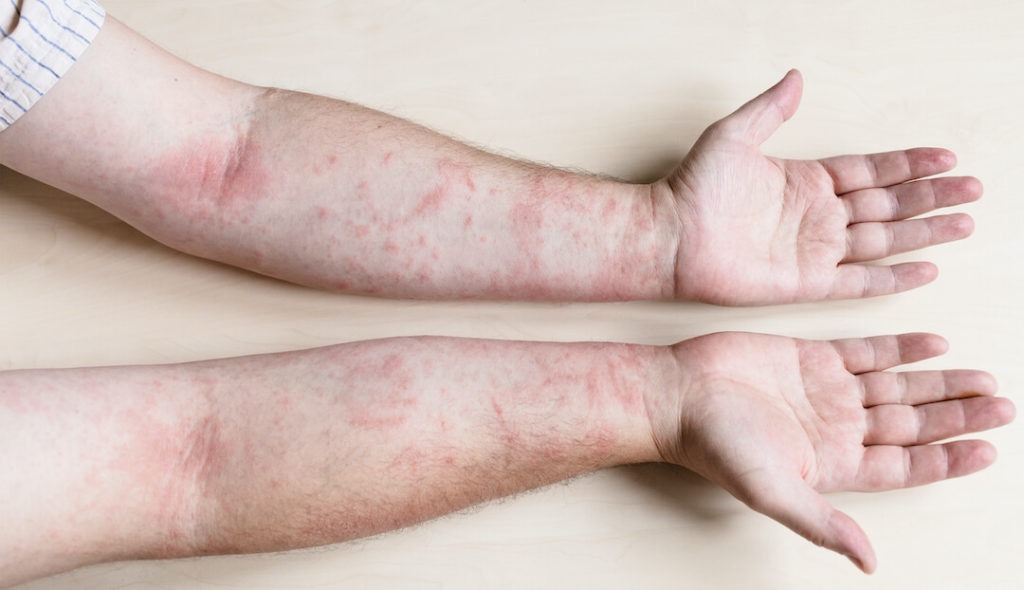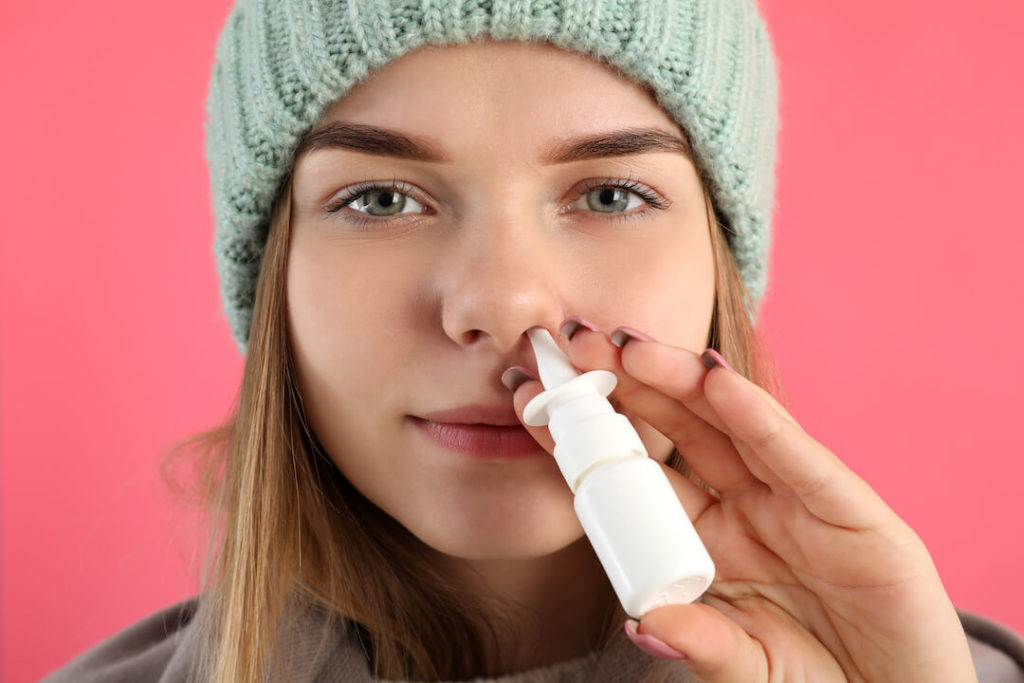Allergy in winter is a very common issue for many people. This article will talk about the causes, symptoms, and prevention tips of allergy in cold weather (also called Cold Urticaria or CU).
Causes of Allergy in Cold Weather
While it’s not clear why certain people suffer from allergies in winter’s cold, the most common reasons for cold urticaria include:
1. Taking a Bath Under Cold Water
Some people become allergic in the winter when they take a bath under cold water. The allergy might be caused by the sudden change in temperature.
2. Exposure to Cold Air
You may develop allergy when you are in exposure to cold air, such as walking by the food or ice cream refrigerators in the hypermarket.
3. Sitting in a Cold Place
Some people sitting in a cold place such as in an air-conditioned room or car for a long period can develop an allergy to cold weather.
4. Swimming in a Cold Water
Some people develop allergies to cold weather when swimming in a cold water pool, sea, or river.
5. Walking Outdoor in a Cold Weather
If you walk in a cold weather without wearing suitable clothes, you are at risk of developing cold urticaria.

Symptoms of Allergy for Cold Weather
Am I Allergic to Cold?
Probably yes, if you encounter any of the following symptoms:
1. Hives or Rash on The Skin
You might be asking yourself: Why do I get hives in the winter? The most common symptom of allergy in cold weather is the development of hives or a rash on the skin. The rash can be itchy and might be accompanied by swelling.
2. Swelling on the Face, Neck, and Skin
Some people with cold urticaria experience swelling on their face and neck, as well as on other parts of their body.
3. Chest Tightness and Difficulty Breathing
The allergy in cold weather symptoms can vary from person to person. In some severe cases, people might experience difficulty breathing after being exposed to cold weather. This might be a sign that they are having an anaphylactic reaction, which is a life-threatening allergy response.

Diagnosis of Allergy for Cold Weather
If you are experiencing allergy symptoms after being exposed to cold weather, it’s important to see a doctor for diagnosis.
How Allergy Test is Done?
The doctor will ask about your symptoms and might do a physical exam. He or she might also order allergy tests to determine what you are allergic to cold weather.
Ice Cube Challenge Test
Doctors might also do the Ice Cube Challenge Test to diagnose cold urticaria. For this test, the doctor will have you hold an ice cube in your hand for a few minutes. If you develop hives or a rash after holding the ice cube, you likely have CU.
Treatment for Allergy in Cold Weather
There is no cure for allergy, but there are many effective treatments available.
Treatment options include over-the-counter medications and prescription of allergy medications, such as:
1. H1 Antihistamines
These medications can help relieve the allergy symptoms, including the itchy rash and hives.
2. Corticosteroids
These medications can help to reduce the swelling and redness on the skin.
3. Epinephrine Autoinjector
This is a life-saving medication for people who are having an anaphylactic reaction.
Always keep in mind that medications should be prescribed by a doctor who will diagnose your symptoms and prescribe the right medicine for you.

Prevention Tips of Allergy for Cold Weather
There are some tips you can follow to help prevent allergy in cold weather:
1. Avoid Exposing Yourself to Cold Air
If possible, try to avoid exposure to cold air, especially if you are allergy.
2. Dress Warmly
When going outside in cold weather, dress warmly to avoid exposure to the cold air.
3. Get Allergy Testing
If you are experiencing allergy symptoms, get allergy testing to determine what you are allergic to. This can help you avoid those allergens in the future.
4. Drink Warm Beverages
Drinking warm beverages, such as tea or coffee, can help to keep you warm and might help to relieve allergy symptoms.
5. Take Warm Shower
Taking a warm shower can also help to relieve allergy symptoms.
6. Use a Humidifier
Using a humidifier can help to add moisture to the air and might help to relieve allergy symptoms.

Remember that the best way to prevent allergy in cold weather is to avoid the causes.
Allergy Versus Cold
Many people confuse allergy symptoms with the common cold. The two conditions have some similar symptoms, but there are key differences. Allergy symptoms tend to be more severe and last longer than cold symptoms.
Allergy symptoms are also usually accompanied by itchy eyes, sneezing, and a runny nose… where is cold symptoms are not. Cold symptoms include a sore throat, headache, and muscle aches.
We hope this clarifies the difference between allergy versus cold.
Allergy vs Sinus
It can be difficult to tell the difference between allergy and a sinus infection, but there are some key differences. A sinus infection is caused by a bacterial or viral infection, while allergy is caused by an allergic reaction.
Sinus infections are usually accompanied by a fever, while allergy symptoms are not. Sinus infections also usually cause pain and pressure in the face, while allergy symptoms are not as severe.
Allergens and Winter
It is estimated that one-third of allergy sufferers have symptoms, despite the misconception that people suffer less from allergy in the winter!
The most common allergens in cold weather are indoor allergens, such as dust mites, pet dander, and mold. These allergens are transferred indoors through open windows and doors, and they accumulate in carpets, furniture, and bedding.
Outdoor allergens, such as pollen and ragweed, can also cause problems in the winter. Cold weather does not kill these allergens, and they can be just as bothersome in the winter as they are in the summer.
If you are not sure what is causing your symptoms, it is best to see a doctor for diagnosis.
Conclusion
Allergy in cold weather (also known as Cold Urticaria) can be caused by exposure to cold air, indoor allergens, or outdoor allergens.
Many things can cause allergy in cold weather. Exposure to cold air, indoor allergens, and outdoor allergens can all cause allergy symptoms. It is important to be aware of the different allergens that can cause problems in the winter, and take steps to avoid them.
There are a number of symptoms that are associated with allergy in cold weather. Some of the most common include rash on the skin and swelling in the face. In some cases, people may also experience heavy breathing.
There are different ways to diagnose allergy in cold weather. One of the most common is allergy testing. This involves exposing the person to a variety of allergens and seeing if they have a reaction. If the person is suspected to be allergic to a certain allergen, they may be asked to avoid exposure to it.
One of the most common allergy treatment options is medication. This can include over-the-counter allergy medications or prescription medications. In some cases, allergy medication may not be enough and the person may need to see a doctor.
It’s important not to take any medication without consulting your doctor.
To prevent allergy in cold weather, the most important thing is to avoid exposure to the allergens that cause problems. This includes avoiding indoor allergens, outdoor allergens, and cold air.
If you enjoyed reading this article, you may want to checkout Top 12 Effective Home Remedies You Must Know.
Related references: